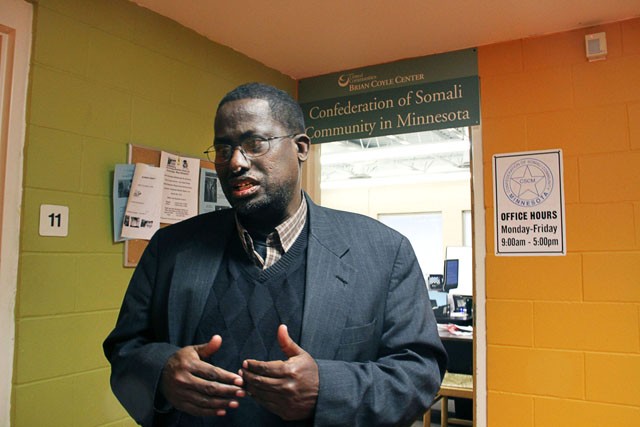ItâÄôd be hard to tell thereâÄôs anything amiss at the Brian Coyle Center in MinneapolisâÄô Cedar-Riverside neighborhood, if not for two police cars parked nearby.
Children played basketball and worked in the computer lab Tuesday at the center, where two men were shot the day before.
The men were standing outside the center Monday evening when they were targets of a drive-by shooting. Both are expected to live. The crime left everyone from community leaders to Minneapolis Mayor R.T. Rybak dealing with the implications and consequences.
Rybak made an informal visit to the center Tuesday evening. Ali Warsame, executive director of the West Bank Community Coalition, was inside when Rybak “just walked in.” Warsame said Rybak made no comments on last night but walked around the center, greeting people one on one.
“It was just a politician visitation,” Warsame said, “just to show people that he cares about this community.”
The incident attracted a lot of outside attention, but the centerâÄôs administration asked community members not to talk to the media, as they “wanted to focus on the positive,” and let the neighborhood heal.
The police have not released identifying information on the individuals involved, but Anthony Wagner, president of Pillsbury United Communities, which runs the Brian Coyle Center, is quick to name youth violence as a cause.
“These sorts of incidents are occurring all over the place,” he said.
Wagner began work Tuesday morning on contacting “key organizations to and people” to draft a plan for improving youth programming in response to the violence, which he said is an increasing problem.
In the past two years, the center, which relies on a variety of financial support, has been “systematically” losing money as funding organizations have cut back or “changed priorities,” Wagner said.
Warsame also said youth violence is an issue âÄî but his solution is too close the center entirely.
Overpopulation in a low-income neighborhood causes problems, Warsame said, and the center, which is “already too small,” attracts kids from other areas in addition to the neighborhoodâÄôs large youth population.
With such a high population of children, such incidents are almost inevitable, he said. “This is not a new thing.”
Cedar-Riverside has seen similar incidents, and the community, along with Minneapolis police, have focused on reducing violent crime in the area.
Saeed Fahia, executive director of the Confederation of Somali Community in Minnesota, said the shootings were not expected.
“We thought that all of that was behind us,” he said.
Fahia is currently talking to the members of his organization and the community to set up a neighborhood-wide discussion of the incident.
Meanwhile, Wagner said PUC is working on getting counseling for the staff and members of the center who witnessed the shooting. The priority, he said, is providing them with resources to “get through this.”








